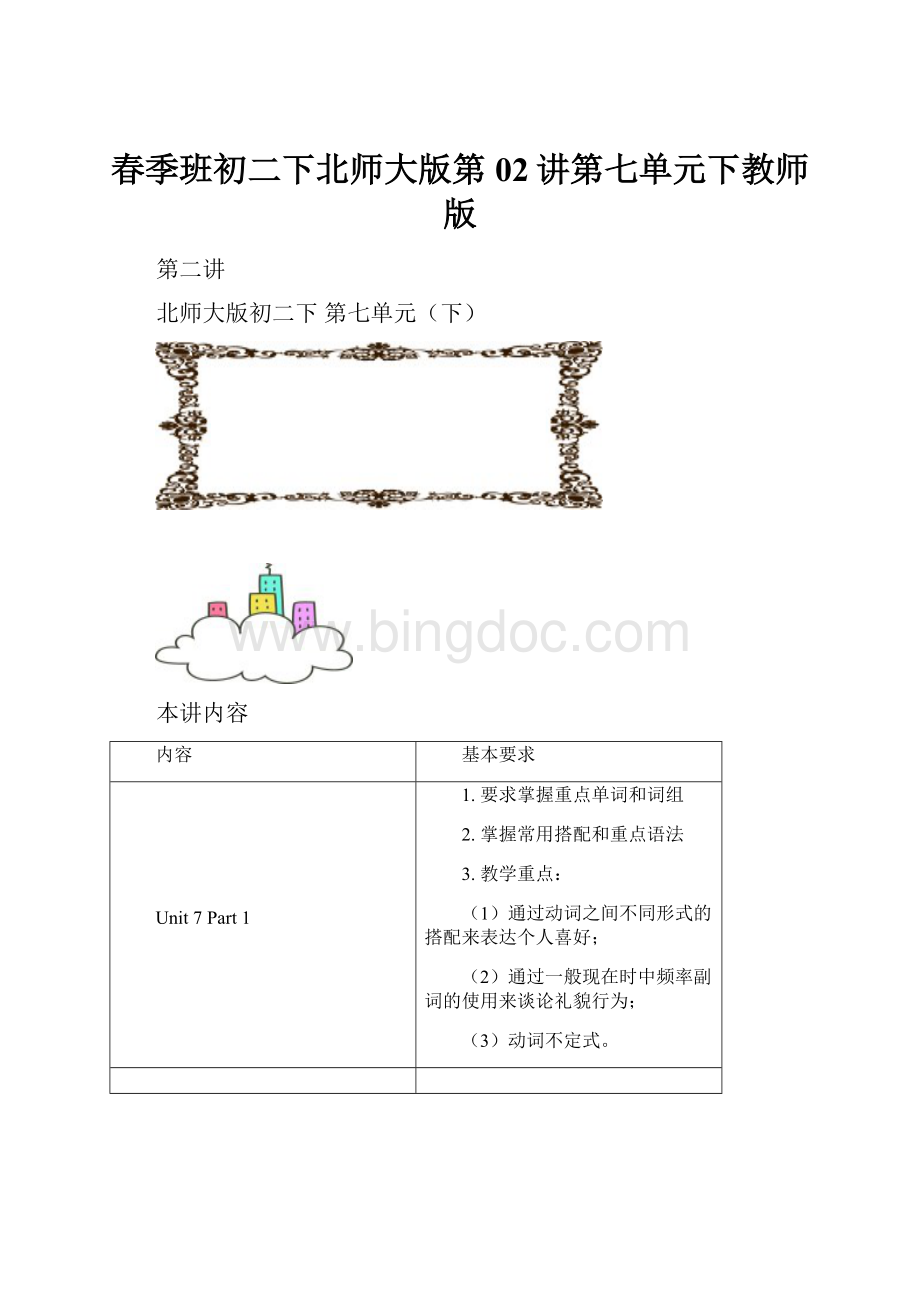春季班初二下北师大版第02讲第七单元下教师版.docx
《春季班初二下北师大版第02讲第七单元下教师版.docx》由会员分享,可在线阅读,更多相关《春季班初二下北师大版第02讲第七单元下教师版.docx(25页珍藏版)》请在冰点文库上搜索。

春季班初二下北师大版第02讲第七单元下教师版
第二讲
北师大版初二下第七单元(下)
本讲内容
内容
基本要求
Unit7Part1
1.要求掌握重点单词和词组
2.掌握常用搭配和重点语法
3.教学重点:
(1)通过动词之间不同形式的搭配来表达个人喜好;
(2)通过一般现在时中频率副词的使用来谈论礼貌行为;
(3)动词不定式。
考点透视
1.---Iusuallygotherebytrain.
---Whynot______byboatforachange?
A.totrygoingB.tryingtogoC.totryandgoD.trygoing
解析:
此题可根据whynot后直接跟原形动词规律而一举确定正确答案为D。
若将B项改为trytogo,则要根据其与trygoing意义之别来确定答案。
依据题干对话内容,乙方是建议甲方尝试乘船变变花样,所以答案仍为D。
2.______areply,hedecidedtowriteagain.
A.NotreceivingB.ReceivingnotC.NothavingreceivedD.Havingnotreceived
解析:
非谓语动词的否定式not应置于首位,B、D皆为错误形式。
A项不能表达先于decided的动作,只有选C项才表没收到信在先,决定再写信在后,所以C为正确答案。
3.CharlesBabbageisgenerallyconsidered______thefirstputer.
A.toinventB.inventingC.tohaveinventedD.havinginvented
解析:
consider表“考虑”意时,其后动词用doing形式,此处不表“考虑”,而表“认为”,这时consider后作宾语补足语或主语补足语多为todo,tohavedone,tobe等形式。
据此可排除B、D两个选项。
又因A表“要发明”意,不合题用,只有C表“发明了”意,才合题用,故选C。
4.Mostoftheartists______tothepartywerefromSouthAfrica.
A.invitedB.toinviteC.beinginvitedD.hadbeeninvited
解析:
“被邀请参加晚会”,应选表被动意的选项,B不可用。
D项少引导词who,也应排除。
又因短暂动词的现在分词被动式不可作定语,C也应排除,只有A.invited(=whowereinvited)才是正确答案。
5.Themurdererwasbroughtin,withhishands______behindhisback.
A.beingtiedB.havingtiedC.tobetiredD.tied
解析:
B表主动意,应排除。
C表“将要被捆绑”,A表“正在被捆绑”都不合题意,只有D项填入空白才能表达“双手被反绑着”这一意思,符合题干情景。
再看一类似例句:
Hecamein,(with)hisheadheldhigh.他昂首走了进来。
同步串讲
Step1知识点梳理
【重点词汇短语】
1.positively_________________反义词:
_________________
2.havetroubledoingsth_________________
3.havedifficultydoingsth_________________
4.paresthwith/tosth_________________
5.thinkabout/of_________________
Therearemanythingstothinkof/aboutbeforeImakeadecision.
Ican’tthinkofhisnameatthemoment.
6.strengthandweakness_________________
7.payfor_________________
8.improve_________________
9.miss_________________
10.benotusedtosth/doing_________________
11.oneafteranother_________________
Afterclass,studentscameoutofclassroomoneafteranother.
12.infrontof_________________
13.tellajoke/story_________________
14.asusual_________________
Step2重难点解析
Ⅰ.词语辨析
1.usedto/beusedtodoing/beusedtodo
(1)used to过去经常,以前常常(现在不做了)
We used to go there every year. 我每年都去那儿。
He is not what he used to be. 他已不是旧日的他了。
(2)be used to doing习惯于做某事
He’s quite used to hard work.(working hard) 他颇习惯于艰苦工作。
Iamusedtolivinginthiscity.我习惯住这个城市了。
(3)be used to do sth.被用来做……
Wood is used to make paper.木材被用来造纸。
Theoldmanusedtogofishingintheriver.老人过去常到这条河钓鱼。
2.lose/miss
这两个词都有“丢失、失去”的意思,但程度上强弱不同。
(1)lose语气较强,一般指失去不易找回。
Helosthisparentswhenhewasyoung.他小时候失去了父母。
(2)miss有“发现失去”的意思,指东西找不到,但有找到的希望。
IamafraidthatJimwillmissalotoflessons.我担心吉姆将会缺很多课。
(3)作定语、表语时,用lost或missing表示“丢失了的,不见了……”
Whohasfoundmylost/missingpen?
谁发现我丢失了的钢笔?
Mymoneyislost/missing.我的钱丢了。
3.spend/take/cost
这三个动词都可用来表示“花费”时间,使用时应注意:
(1)take常用it作主语。
句型:
Ittakessb.timetodosth.如:
Ittookmethreehourstofinishmywork.完成这项工作用了我3个小时。
(2)spend则用人作主语,常用的句型是“sb.spendstime(in)doingsth.”。
Hespent30minutes(in)writingtheletter.他用了30分钟写那封信。
(3)cost后面更多地用于句型“It/sth.costsb.+金钱”,表示“某人花……钱做某事”。
TheTVsetcosthim5000yuan.这台电视机花了他5000元。
★注意:
cost—cost---cost过去式、过去分词和原形一样。
(4)pay以人作主语,只能用于花钱,常与for连用。
“sb.paysmoneyforsth.”
Ipaytwoyuanforthispen.
Ⅱ.词组的使用
1.Weliketravelingbybusbutweprefertravelingbytrain.
e.g.Tomusedtodrinkalotofcoffee.Nowhepreferstea.
Heofferedtodriveustothetheater,butwepreferredtowalk.
Hepreferssingingtoacting.
2.SometimeswehelpGrandpawithsomejobsonthefarmbutifwedon’tfeellikedoinganything,that’sokaywithhim.
e.g.Youcantalktomewheneveryoufeellikeit.
Ifeellikegoingtothecinemathisafternoon.
3.Therearemanydifferentwaystoshowrespecttoolderpeople.
e.g.Ihatethosewhoshowednorespecttotheirparents.
Irespecthisknowledge.
4.Forexample,mostpeoplespeakmoreformallywhentheytalktoelderlypeople.
old指年老的
older指年纪较大的
elder指两个人中年纪稍大的,通常指家中兄弟姐妹之间
elderly是对年纪较大的人的尊敬说法。
5.Allpublicbuildingsaresupposedtoprovidespecialfacilitiesforpeopleinwheelchairs.
besupposedtodo应当,理应
Heissupposedtobehereinaboutanhour.
Hewassupposedtobeacollegegraduatebutheknewnothingabouthistory.
providefor给……提供
Theyprovidedfreshvegetablesforus.
Heprovidedforhisfamilybyworkinginasmallfactory.
6.Whathappenedtopeoplewhodon’tlovethemselvesanddon’thaveconfidenceinthemselves?
e.g.YouknowIhaveperfectconfidenceinyou.
Sheisshortofconfidenceinherself.
Idon’thaveenoughconfidenceinmyself.
7.Ifyoudon’tloveyourselfandhaveconfidenceinyourself,youwillalwayshavedifficultylovingotherpeople.
e.g.Hedoesn’thavemuchdifficulty(in)workingouttheproblems.
Ihadsomedifficultyindoingmath.
8.Thatway,youcanaccepttheminotherpeople.
e.g.Youcanlookatthingsthatway,butthesocietydoesn’t.
Thisway,youcankeepgoodrelationwiththem.
9.SometimesImissmyfamilyandI’mnotveryusedtothefoodhere.
e.g.He’isnotusedtoworkingalone.
Youshouldgetusedtoyournewjobquickly.
10.doone’sbest
e.g.Hedidhisbesttofinishthetask.
Step3重点语法讲解
Ⅰ.反身代词
1.形式:
反身代词是所有格形容词+-self组成的复合词,或由宾格代词+-self组成。
单数:
myselfyourselfhimselfherselfitselfoneself
复数:
ourselvesyourselvesthemselves
2.使用:
(1)英语中,反身代词通常与句子的主语所指相同。
e.g.Hefelloverandhurthimself.
Shesometimestalkstoherself.
Ihavecutmyself.
Thebossgavehimselfarise.
Doyouenjoyyourselfonyourbirthday?
(2)反身代词也用来特别强调一个动作。
这时,我们通常把重音放在反身代词上。
e.g.Didyoubuythecakeatthestore?
No,Ididn’t.Imadeitmyself.
Tom’sallrighthimself,buthiswifeisbadlyhurt.
Youcanblamenoone,butyourself.
(3)“by+反身代词”表示“无援地”“独自地”
e.g.Helivesbyhimself.
Susanmadethisdoll’sdressallbyherself.
(4)反身代词用在be或系动词后,表示感觉,情绪或状态。
e.g.Idon’tknowwhat’sthematterwithme.I’mnotmyselftoday.
(5)固定搭配:
Helpyourself!
Makeyourselfathome.
Don’tupsetyourself.
Icouldn’tmakemyselfheardabovethenoise.
Ⅱ.过去进行时态
1.过去进行时主要表示过去某个时刻或某一阶段正在进行的动作,常和表示过去时间的状语then,atthis(that)time,yesterday,atnine,lastnight等连用。
但在不少情况下,没有表示时间的状语,这时需要通过上下文来表示。
结构:
was/were+doing
Whatwereyoudoingatninelastnight?
昨晚九点时,你在做什么?
Icalledyouyesterdayafternoonbuttherewasnoanswer.
Iwasvisitingafriendofminemostoftheafternoon.
2.当两个一长一短的动作在过去某时间同时发生时,用过去进行时表示较长的动作。
过去进行时可用于主句,也可用于从句。
★注意:
when,while,as引导时间状语从句的区别
when,while,as显然都可以引导时间状语从句,但用法区别非常大。
(1)when可以和延续性动词连用,也可以和短暂性动词连用;而while和as只能和延续性动词连用。
Whydoyouwantanewjobwhenyou’vegotsuchagoodonealready?
(get为短暂性动词)你已经找到如此好的工作,为何还想再找新的?
Sorry,Iwasoutwhenyoucalledme.(call为短暂性动词)对不起,你打电话时我刚好外出了。
Strikewhiletheironishot.(is为延续性动词,表示一种持续的状态)趁热打铁。
Thestudentstooknotesastheylistened.(listen为延续性动词)学生们边听课边做笔记。
(2)when从句的谓语动词可以在主句谓语动作之前、之后或同时发生;while和as从句的谓语动作必须是和主句谓语动作同时发生。
①从句动作在主句动作前发生,只用when。
Whenhehadfinishedhishomework,hetookashortrest.
(finished先发生)当他完成作业后,他休息了一会儿。
WhenIgottotheairport,theguestshadleft.
(gotto后发生)当我赶到飞机场时,客人们已经离开了。
②从句动作和主句动作同时发生,且从句动作为延续性动词时,when,while,as都可使用。
When/While/Asweweredancing,astrangercamein.
(dance为延续性动词)当我们跳舞时,一位陌生人走了进来。
When/While/Asshewasmakingaphonecall,Iwaswritingaletter.
(make为延续性动词)当她在打电话时,我正在写信。
(3)当主句、从句动作同时进行,as表示“随着……”;“一边……,一边……”之意,只能用as。
Asthetimewenton,theweathergotworse.
Theatmospheregetsthinnerandthinnerastheheightincreases.
Asyearsgoby,Chinaisgettingstrongerandricher.
Thelittlegirlssangastheywent.
Thesadmothersatontheroadside,shoutingasshewascrying.
(4)在将来时从句中,常用when,且从句须用一般时代替将来时。
YoushallborrowthebookwhenIhavefinishedreadingit.
WhenIwascleaningthewindows,mybrotherwassweepingthefloor.
TheywerewatchingTVwhenthelightswentout.
3.过去进行时表示过去将来的动作
现在进行时可以表示将来的动作。
同样,过去进行时也可以表示从过去某时间看将要发生的动作,常用在间接引语中。
ShewenttoseeXiaoLi.
Hewasleavingearlythenextmorning.
Sheaskedhimwhetherhewasingbacktolunch.
4.过去进行时和一般过去时的区别
用一般过去时,只是表示有过这件事;用过去进行时,则强调了动作的连续性。
LiMingwashedthedishes.李明洗过盘子了。
LiMingwaswashingthedishes.李明在洗盘子。
ThechildrenwatchedTVyesterdayevening.昨天晚上孩子们看了电视。
ThechildrenwerewatchingTVyesterdayevening.昨晚孩子们整晚都在看电视。
(没干别的)
Iwasreadinganovelthismorning.上午我在看小说。
(可能没看完)
Ireadanovelthismorning.上午我看了一本小说。
(已经看完了)
练一练
1.Sheaskedhimwhetherhe_____backforlunch.
A.e B.wasing C.came D.hade
2.Couldyoutellmewhen______?
A.sheising B.shewasing C.willbee D.isheing
3.Theteacher______whenIcameintotheclassroom.
A.isdrawing B.draws C.hasdrawn D.wasdrawing
4.Thepizza______bymymother.Wouldyouliketohavesome?
A.makes B.wasmaking C.made D.wasmade
5.Nobodynoticedwhatshe______atthemoment.
A.willdo B.wasdoing C.hasdone D.haddone
6.Wasitraininghardwhenyou_____thismorning?
A.left B.leaves C.wasleaving D.wouldleave
Keys:
1-6BA D D B A
随堂巩固
一、单选
1.What______fromthreetofouryesterdayafternoon?
A.haveyoudone B.hadyoudone C.didyoudo D.wereyoudoing
2.---Icallyouyesterdayevening,buttherewasnoanswer.
---Oh.,I’msorryI_____dinneratmyfriend’shome.
A.home B.had C.washaving D.havehad
3.Mymother_____whilemyfather_____TV.
A.cooked;waswatching B.wascooking;waswatching
C.wascooked;watched D.cooked;watched
4.WhenIgothome,myson_____themusic.
A